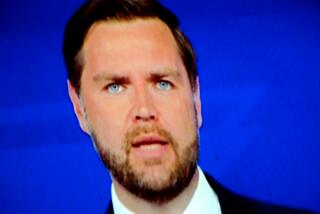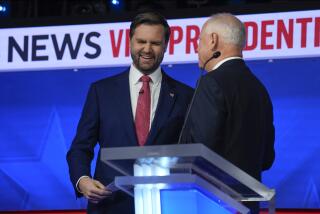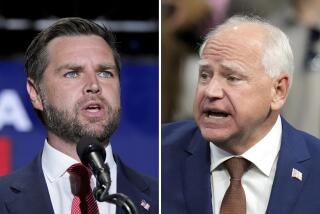Presidential Rivals Head Into Round 2
Can Ross Perot do it again? Can Bill Clinton lighten up? Can President Bush stand up for himself as forcefully as Dan Quayle did in his stead Tuesday night at the vice presidential debate in Atlanta?
And will any of this make a difference on Election Day?
Those are some of the questions in the air as the three presidential contenders gather for their second debate tonight at the University of Richmond in Virginia. The 90-minute debate starts at 6 p.m. PDT and will be televised by the four national broadcast networks--ABC, CBS, NBC and Fox--as well as several cable networks, including CNN.
On Wednesday, each of the candidates kept a low profile. Bush held a mock debate at the White House as part of his preparation. Clinton nursed his hoarse voice in Williamsburg, Va., while Perot worked in private in Dallas.
Tonight’s encounter may be more like a joint town hall meeting than an actual debate. The three candidates will answer questions from an audience of undecided voters chosen by the Gallup Organization, with a moderator providing follow-up inquiries. As of Wednesday, the rules on the freedom of the candidates to respond to each other’s answers--a format that enlivened the vice presidential debate--were still somewhat in flux.
As the traveling army of reporters, consultants, aides and spin doctors marched up the highway from Atlanta to Richmond, their biggest question was whether anything Bush or Perot might say tonight--or next Monday, in the candidates’ final debate--could scramble a race that has hardly fluctuated since Labor Day.
Although the first debate produced a modest boost in the polls for Perot, it left undisturbed the gap between the two major contenders. In a series of surveys released since the Sunday debate in St. Louis, Clinton holds a lead ranging from 9 to 15 percentage points over Bush, with Perot attracting only about 12%.
Democrats acknowledge that Clinton did little to expand his lead with his polished but cautious and vague performance on Sunday. Known as a candidate who reels off at least five programs for every problem, Clinton spoke mostly in generalities. He went through the entire debate without mentioning such cornerstones of his agenda as providing universal access to college financing for young people, placing a time limit on welfare and establishing a $20-billion annual fund for rebuilding the nation’s infrastructure.
“Clinton went into that debate literally like he had dynamite strapped on his back and the last thing he wanted to do was make any sparks fly,” said Democratic media consultant Joe Trippi.
But Bush also failed to ignite any tinder. With his lethargic--and often defensive--performance, many Democrats believe Bush squandered his last opportunity to persuade voters to give him a new look.
“Bush put himself in an awful spot,” said veteran Democratic pollster Peter D. Hart. “He neither attacked nor did he paint a vision for America. To take neither road was a disaster. The poll numbers I have seen in the past 48 hours . . . make me feel like voters are closing the book on him.”
With polls showing Clinton holding substantial leads in such battleground states as Ohio, Pennsylvania and Michigan, even some well-placed Republicans privately say that they fear Hart may be right. And if Bush has any chance at all, many Republicans say, he will have to use the remaining two debates to pound home the attacks on Clinton’s economic plan and trustworthiness that Quayle sharpened in Tuesday’s vice presidential debate.
Bush’s “only chance will be to really go after and tear into Bill Clinton,” said conservative activist and author Terry Eastland, a former Reagan Administration strategist. “Quayle very sharply, very directly went after Bill Clinton. If Bush tore into Clinton, he might have some prospect of rattling the guy.”
Added one senior Administration official: “It may be too late, but Quayle’s performance creates at least a window for Bush to really hammer Clinton.”
Bush will probably have to play some defense too. On Wednesday, a parade of prominent Democrats accused the State Department of violating government privacy guidelines in attempting to find--in response to freedom of information requests from news organizations--documents relating to Clinton’s college-age activities.
In all of the calculations about tonight’s debate--and perhaps about the campaign itself--Perot remains a wild card. With Bush and Clinton stiffly struggling to appear presidential Sunday, Perot dominated the first debate with brusque and folksy one-liners that cut like a searchlight through his rivals’ foggy Washington-speak.
Perot also scrimped on specifics, and not all of his facts held up. Perot said “19 of 20 computer chips . . . in this country now come from Japan”; actually, its one in five. But in round one, it was “Hee Haw” vs. C-SPAN, and the result was no contest.
Another strong performance tonight could bump up Perot’s support to the point where he might potentially influence the outcome in some states, analysts say. But Perot still faces enormous hurdles in moving beyond a spoiler’s role. Doubts about his temperament and his ability to actually win the race remain overwhelming, according to recent surveys. Many observers say the faltering performance in Tuesday’s debate of his running mate, retired Vice Adm. James B. Stockdale, is bound to deepen doubts about the kind of government Perot might bring with him.
In the first debate, Bush and Clinton treated Perot with a patronizing gentleness. They called him “Ross” while for the most part they addressed each other formally. They also generally downplayed their disagreements with his ideas, which, in many cases, are substantial. Since that hands-off approach allowed Perot to steal much of the limelight, some of his supporters expect the two major-party contenders to train their sights on him tonight.
“I think that was a little bit of an eye-opener for them,” says Adrienne Meltzer, the media coordinator for Perot’s campaign in California.
But officials in both the Bush and Clinton campaigns insist they won’t waste bullets on Perot. Some Bush strategists, in fact, worry that Clinton may be content to let Perot steal the limelight, thereby denying Bush another of his dwindling opportunities to regain footing.
Times staff writer Douglas Jehl contributed to this story.
More to Read
Get the L.A. Times Politics newsletter
Deeply reported insights into legislation, politics and policy from Sacramento, Washington and beyond. In your inbox three times per week.
You may occasionally receive promotional content from the Los Angeles Times.










